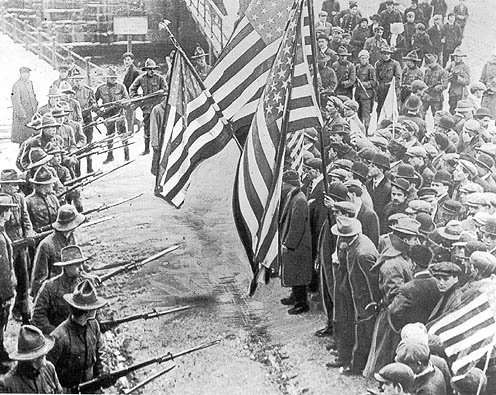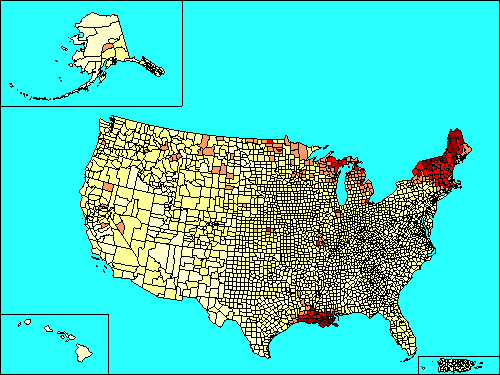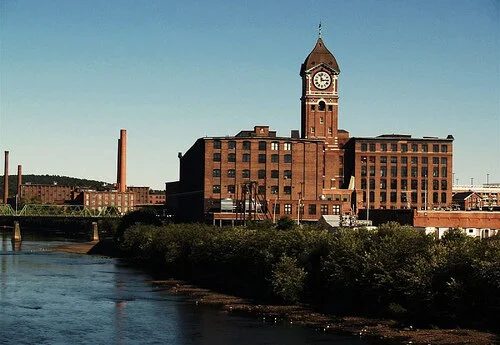
In the time of textile mills
Massachusetts National Guardsmen with fixed bayonets surround a parade of strikers during 1912 Lawrence textile strike
“It is a long time since I flapped mv wings,
a long time since I stood on the roof of my house
in Lawrence, Mass., or Michael's in No. Andover,
a little whiskey in one hand, the past slipping
through the other, a little closer to the heaven of
dreams ….
“From where we stood I could see the steeple of the French
church. Further back, it was 1912, and I could almost
see the tenements of the French women who worked
the fabric mills …
weaving the deadly dust into their lungs….’’
— From “The Angels of 1912 and 1972,’’ by Richard Jackson
Distribution of French Canadians in the U.S. Census
Lawrence moves out of its funk
The old Ayer Mill building on the Merrimack River in Lawrence
From Robert Whitcomb’s “Digital Diary,’’ in GoLocal24.com
Old cities can be brought back, if not to their boom times, at least to more stability and even a modicum of prosperity. An example to watch is Lawrence, Mass., an old mill town on the Merrimack River. Even with the effects of the pandemic, the city is much better off than it was a decade ago, when Boston Magazine called it “City of the Damned” – a center of rising crime and poverty. (I spent some time there back in the fall of 1968, when I was teaching high school next door, in North Andover, Mass. It was a downer then but it still had a fair number of mills operating and was far from the disaster it became by 1990.)
A group called the Lawrence Partnership has been a key to the city’s economic and social revival. This includes a bunch of business and other community leaders formed in 2014 to “stimulate economic development and improve the quality of life” in Lawrence. This group has helped strengthen the city’s finances, cut crime, improve education and lure new business. COVID has made things more difficult, of course, but the city’s leaders are pressing on.
Lessons for cities in southeastern New England? Hit this link to learn more.
In the 1912 Lawrence textile strike, Massachusetts National Guardsmen with fixed bayonets surround a parade of strikers.
In Lawrence, the bizarre High Service Water Tower (1895), also called Tower Hill Water Tower, named an American Water Landmark in 1979 by the American Water Works Association
'The opposite of today'
The Ayer Mill in Lawrence
“Don’t even try looking for him where he grew up
in Lawrence, Mass. The whole town is burning.
The remarkable thing about tomorrow is that everything is
the opposite of today. The shadow that now stalks you
becomes your confessor….’’
— From “No Fault Love,’’ by Richard Jackson
N.E. Council update on COVID-19-related activities
“Brother Jonathan’’ was a 19th Century personification of New England.
BOSTON
COVID-19 briefing from The New England Council (newenglandcouncil.com)
“As our region and our nation continue to grapple with the Coronavirus Disease (COVID-19) pandemic, The New England Council is using our blog as a platform to highlight some of the incredible work our members have undertaken to respond to the outbreak. Each day, we’ll post a round-up of updates on some of the initiatives underway among Council members throughout the region. We are also sharing these updates via our social media, and encourage our members to share with us any information on their efforts so that we can be sure to include them in these daily round-ups.
You can also check our COVID-19 Virtual Events Calendar for information on upcoming COVID-19 related programming – including Congressional town halls and webinars presented by NEC members.
Here is the March 30 roundup:
Medical Response
Novartis Anti-Malaria Drug Gets Emergency Approval from FDA – Following emergency approval from the Food and Drug Administration (FDA) of two anti-malaria drugs for the potential treatment of COVID-19, Novartis, along with Bayer, is contributing millions of doses of the drugs, hydroxychloroquine and chloroquine. The drugs have previously received much attention following some anecdotal evidence to support the benefits to relieve respiratory symptoms of infected patients, and could be a potential treatment to reduce symptoms and strain on healthcare providers. The Washington Post has more.
Sanofi Expands Clinical Trial – After announcing the beginnings of its clinical trials in the United States last week, Sanofi—along with Regeneron Pharmaceuticals—has expanded the trial in Italy, Spain, Germany, France, Canada, and Russia. The trials will test the rheumatoid arthritis drug Kevzara as a potential treatment for patients around the world. Read more in CNBC.
Economic/Business Continuity Response
New Balance Shifts to Producing Masks – At its Lawrence, Mass., manufacturing facility, New Balance has begun producing prototypes for face masks to distribute around the region and country. As hospitals and those exposed to the virus begin to see shortages of protective gear such as face masks, New Balance has joined other local manufacturers in an “all hands on deck” response to the need. Read more in WCVB Boston.
Harvard University Guarantees Pay for All Workers Through End of Semester – To ensure that those who are willing and able to work are paid, Harvard University updated its policies to include payment and benefits for all workers through May 28. The updated policy includes those employed in dining, security, and custodial services across the university, as well as those in administrative and contract roles. Harvard is also providing stabilization funds to the six independent childcare centers on campus to allow the employees to work. The Boston Business Journal
Community Response
Suffolk University, Pine Street Inn to Repurpose University Residence Hall to House Homeless Population – In light of its switch to remote learning, Suffolk University has offered a residence hall to the homeless population of Boston. The residence hall will provide 172 beds, and will be managed by both Pine Street Inn and the city’s Public Health Commission to reduce congestion and increase social distancing in shelters. The Boston Business Journal has more.
AARP Launches Platform to Connect Volunteers with Those in Need – AARP announced its new online platform, AARP Community Connections, to organize and mobilize volunteer groups and connect them with people and families who need assistance. From groceries to financial assistance to emotional support, users of the platform can receive a wide variety of support in the age of social distancing. Read more in KTVZ.
Amgen Donates $12.5 Million to Relief Efforts – Amgen has committed $12.5 million to support the efforts of local emergency and patient-focused services. In addition to the funds, Amgen is supporting online learning platforms to provide resources to students as they transition to remote instruction. Read more.
Tufts Health Plan Announces $500,000 for Food-Insecure Elderly People – Tufts Health Plan has committed the first half of its $1 million donation in relief efforts to combat food insecurity among in the New England region. Tufts has identified 21 organizations that provide meals and other support to individuals we well as food banks and other businesses coordinating a regional response as the recipients of the first wave of funding. Read more in the Portsmouth Press.
Stay tuned for more updates each day, and follow us on Twitter for more frequent updates on how Council members are contributing to the response to this global health crisis.’’







